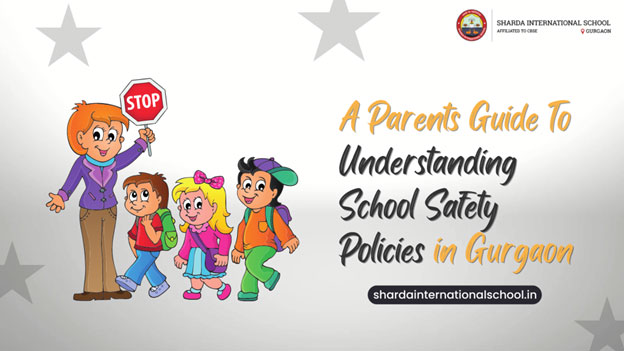A Parent’s Guide to Understanding School Safety Policies in
Gurgaon
 Do you know? Schools are the place where children spend almost 7
hours a day, and when it comes to safety- it’s a big concern.
Safety at school is a major topic for everyone, it’s a place that
parents mostly rely on. Every parent entrusts a piece of their
heart to their child's school. Safety rules at schools are most
important, especially with news reports highlighting emergencies.
This guide aims to empower you with knowledge about school safety
policies in India, fostering a sense of security and open
communication with your child.
Do you know? Schools are the place where children spend almost 7
hours a day, and when it comes to safety- it’s a big concern.
Safety at school is a major topic for everyone, it’s a place that
parents mostly rely on. Every parent entrusts a piece of their
heart to their child's school. Safety rules at schools are most
important, especially with news reports highlighting emergencies.
This guide aims to empower you with knowledge about school safety
policies in India, fostering a sense of security and open
communication with your child.
Key Safety rules at schools
The school has to implement various policies for the safety
concerns of the students, let’s learn what all they have to
follow:
Security Infrastructure
Schools are mandated to have boundary walls, security guards, and
proper access control. CCTV cameras in strategic locations are
becoming increasingly common. As per the government law for the
students safety, the schools have CCTV for the students safety and
it's important and a major part of safety rules at schools.
Disaster Management
Schools must have a Disaster Management Plan (DMP) outlining
procedures for emergencies like earthquakes, fires, and floods.
This plan should include designated evacuation routes, assembly
points, and training for staff and students. The National Disaster
Management Authority (NDMA) provides resources and guidelines for
schools to develop effective DMPs.
Fire Safety
Fire safety at school measures are crucial. Schools must have fire
extinguishers, smoke detectors, and clearly marked exits. Regular
fire drills are mandatory to ensure students and staff are
familiar with evacuation procedures as per the safety rules at
schools.
Student Wellbeing
Schools have a responsibility to address student wellbeing. This
includes anti-bullying policies, procedures for reporting
harassment or violence, and access to counselors. The Central
Board of Secondary Education (CBSE) mandates schools to establish
an Internal Complaints Committee (ICC) to address sexual
harassment complaints.
Legals as Per Indian Law For Safety rules at schools
Right to Free and Compulsory Education Act (2009)
emphasizes a safe and secure learning environment. Schools must
comply with guidelines set by the Ministry of Human Resource
Development (MHRD) and state education departments for the safety
rules at schools. These guidelines encompass various aspects of
Safety rules at schools, including infrastructure, disaster
preparedness, and measures to counter bullying and violence.
Why are Safety rules at schools important?
According to the National Crime Records Bureau of India (NCRB), in
2021, crimes against children under 18 years old in India
increased by 1.2% from 2020. While schools themselves may not see
a high number of incidents, having robust safety measures helps
deter crime and ensures a swift response in case of emergencies.
Here are some questions you can ask your child's school
administration to gain a better understanding of their Safety
rules at schools
-
1. Can I see a copy of the school's emergency preparedness plan?
- 2. How are visitors screened and monitored?
- 3. What is the student-to-supervisor ratio?
-
4. What resources are available for students to report safety
concerns or bullying?
-
5. How does the school communicate with parents during
emergencies?
Parents' Role in Safety Rules At Schools
Parents play an important role and always understanding the
policies to protect the child is the first step. Here's how you
can be an active participant in your child's Safety at school:
-
1. Open Communication: Talk to your child about
school safety in an age-appropriate manner. Explain emergency
procedures and the importance of reporting any concerns to a
trusted adult.
-
2. Practice Makes Perfect: Review school safety
procedures with your child at home. Talk about escape routes in
case of fire and what to do during a lockdown drill.
-
3. Be Informed: Stay updated on school safety
protocols by attending school meetings, reading newsletters, and
following the school's social media pages (if they have one).
-
4. Volunteer: Consider volunteering at your
child's school. This allows you to observe safety measures
firsthand and build relationships with school staff.
-
5. Advocate for Change: If you have any
concerns about the school's safety policies, don't hesitate to
voice them to the school administration. Work collaboratively to
find solutions that enhance the safety of all students.
Conclusion
Understanding and supporting Safety rules at schools is very
important for the well-being of students. Parents can help by
staying informed, talking to their children about safety, taking
part in safety activities, asking for improvements when needed,
and supporting mental health programs.
At Sharda International School, we take care of the safety of our
students at every step whether it be physical safety or
mental health safety
We have strong safety measures like regular fire drills, CCTV
cameras, and strict anti-bullying policies. Our goal is to create
a safe and supportive environment where students can learn and
grow without any worries.
There are many different challenges, schools, and parents need to
work together to make sure children are safe. With the right
safety measures in place, we can ensure that our children not only
get a good education but also feel safe and secure while doing so.
We believe that the safety of our children is non-negotiable. We
can create a future where every child feels safe, happy, and
valued.